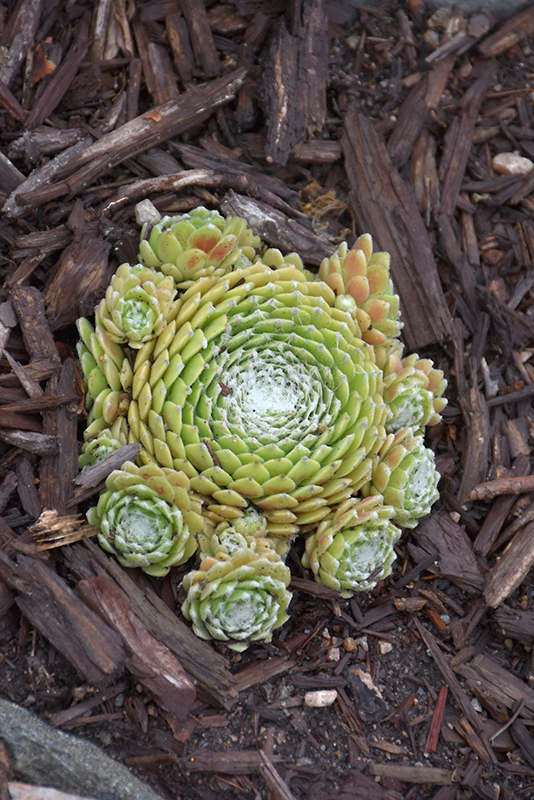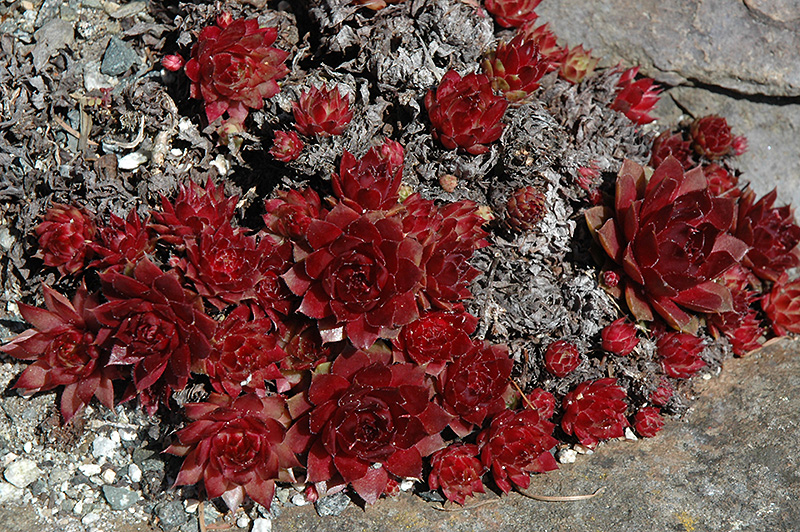Plant Library
Robin Hens And Chicks
Sempervivum arachnoideum 'Robin'
Plant Height: 3 inches
Flower Height: 8 inches
Spacing: 10 inches
Sunlight:
![]()
Hardiness Zone: 2
Other Names: House Leek
Description:
A strikingly beautiful succulent emerging in crimson spring coloring; perfect for adding interest and texture to groundcover and rock garden applications; very sturdy and hardy with excellent wintering ability
Ornamental Features
Robin Hens And Chicks is primarily valued in the garden for its distinctive form, with the flower stalks towering over the foliage. It features unusual clusters of pink star-shaped flowers with dark red bracts rising above the foliage in mid summer. Its attractive tomentose pointy leaves emerge silver in spring, turning bluish-green in color with prominent red tips and tinges of silver throughout the season.
Landscape Attributes
Robin Hens And Chicks is a dense herbaceous perennial with tall flower stalks held atop a low mound of foliage. It brings an extremely fine and delicate texture to the garden composition and should be used to full effect.
This plant will require occasional maintenance and upkeep, and should not require much pruning, except when necessary, such as to remove dieback. Deer don't particularly care for this plant and will usually leave it alone in favor of tastier treats. Gardeners should be aware of the following characteristic(s) that may warrant special consideration;
- Spreading
Robin Hens And Chicks is recommended for the following landscape applications;
- Rock/Alpine Gardens
- Border Edging
- General Garden Use
- Container Planting
Planting & Growing
Robin Hens And Chicks will grow to be only 3 inches tall at maturity extending to 8 inches tall with the flowers, with a spread of 12 inches. When grown in masses or used as a bedding plant, individual plants should be spaced approximately 10 inches apart. Its foliage tends to remain low and dense right to the ground. It grows at a medium rate, and under ideal conditions can be expected to live for approximately 20 years. As an herbaceous perennial, this plant will usually die back to the crown each winter, and will regrow from the base each spring. Be careful not to disturb the crown in late winter when it may not be readily seen!
This plant should only be grown in full sunlight. It prefers dry to average moisture levels with very well-drained soil, and will often die in standing water. It is considered to be drought-tolerant, and thus makes an ideal choice for a low-water garden or xeriscape application. It is not particular as to soil pH, but grows best in sandy soils, and is able to handle environmental salt. It is highly tolerant of urban pollution and will even thrive in inner city environments. This is a selected variety of a species not originally from North America. It can be propagated by division; however, as a cultivated variety, be aware that it may be subject to certain restrictions or prohibitions on propagation.
Robin Hens And Chicks is a fine choice for the garden, but it is also a good selection for planting in outdoor pots and containers. It is often used as a 'filler' in the 'spiller-thriller-filler' container combination, providing a mass of flowers and foliage against which the larger thriller plants stand out. Note that when growing plants in outdoor containers and baskets, they may require more frequent waterings than they would in the yard or garden. Be aware that in our climate, most plants cannot be expected to survive the winter if left in containers outdoors, and this plant is no exception. Contact our experts for more information on how to protect it over the winter months.
Disclaimer - This Plant Finder tool is an online resource representing many of the varieties that we carry over the course of the season, and is intended for informational purposes only. Inventory varies seasonally, so we cannot guarantee that every plant will be in stock at all times - please contact the store directly for availability. It does not include our entire inventory of plants, so be sure to visit our store to see varieties that may not be represented on this list.




